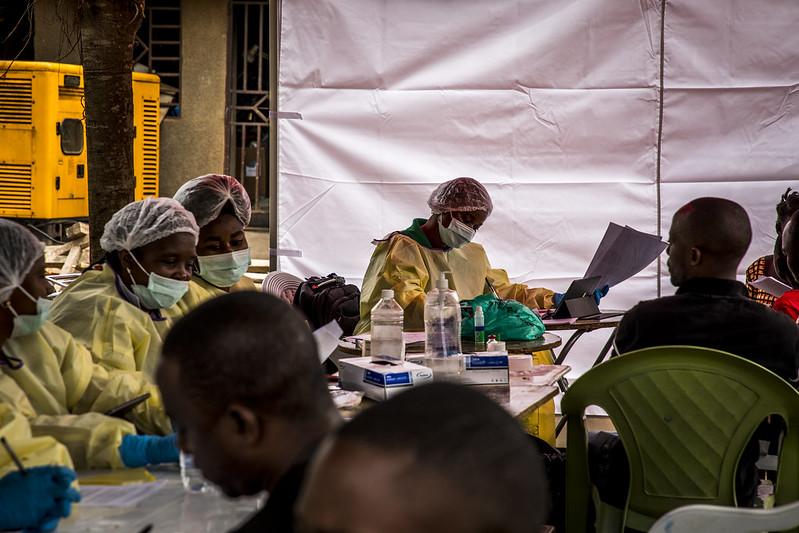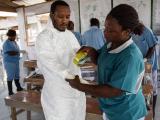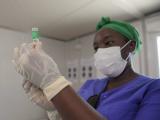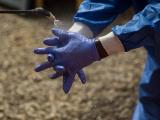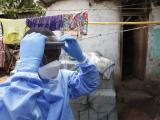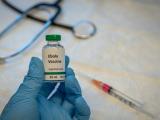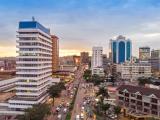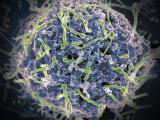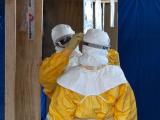The VSV-EBOV vaccine has been a useful tool in battling Ebola outbreaks and is known for its high efficacy, but researchers who examined its impact on patients in Ebola treatment centers found that the vaccine also helped protect against death.
The retrospective cohort study, led by researchers from Doctors without Borders and the Democratic Republic of the Congo (DRC) analyzed patients who were admitted to Ebola health facilities during the DRC's tenth outbreak, which occurred between July 2018 and April 2020. They published their findings this week in The Lancet Infectious Diseases.
The outbreak, centered in North Kivu and Ituri provinces, was the world's second largest and was marked by flare-ups of civil unrest that included attacks on healthcare workers in Beni and attacks on Ebola treatment centers.
A ring vaccination trial conducted in Guinea toward the end of West Africa's massive Ebola outbreak found that the vaccine—Ervebo, developed in Canada and made by Merck—was 100% effective, a bright ray of hope amid the devastating outbreaks. In outbreaks that followed, however, some breakthrough infections were reported, including as many as 25% that were documented in a trial of four Ebola antiviral treatments.
Lower fatality rates and viremia
For the 2,279 patients with confirmed Ebola infections who are admitted to Ebola treatment facilities in the DRC's outbreak, researchers assessed vaccination status and case-fatality rates. They also obtained cycle threshold values for nucleoprotein at admission to see of viremia levels varied by vaccination status. Of the group, 1,015 (45%) were unvaccinated.
The team found that the case-fatality risk was much lower in the vaccinated group: 25% for the vaccinated group compared with 56% for the unvaccinated group. Protection against death was seen, even when researchers adjusted for Ebola-specific treatment, age, and time from symptom onset to admission.
Analysis of cycle threshold data found that viremia was lower in vaccinated patients compared to their unvaccinated peers, with the biggest difference in those who were vaccinated 21 days or more before they became ill.
Etienne Gignoux, MPH, a study coauthor and director of the epidemiology and training department at Médecins Sans Frontières' (MSF's) Epicentre, said in an MSF news story that the study's viremia findings build support for the vaccine's use as postexposure prophylaxis (prevention). "In addition to the direct benefit, our results allow us to consider combining vaccination and treatment of patients who have been in direct contact with a person with confirmed Ebola virus disease in order to reduce the risk of illness and death."
Filling in key knowledge gaps
The researchers said their findings fill in some of the knowledge gaps about VSV-EBOV, including that vaccine failure is compatible with high vaccine effectiveness. They also said the viremia patterns suggest a possible mechanism behind the protection against death.
Our results allow us to consider combining vaccination and treatment of patients who have been in direct contact with a person with confirmed Ebola.
"Our results reinforce the importance of vaccinating populations who are at risk of exposure to Ebola virus to reduce the risk of infection and—if infection occurs—the risk of death," the team wrote.
Strong benefits could help build trust
In a related commentary in the same issue, William A. Fischer II, MD, and David A. Wohl, MD, from the University of North Carolina at Chapel Hill, wrote that the study shows that VSV-EBOV's protection extends beyond infection. However, as with Ebola therapeutics, timing matters. Fischer is with the division of pulmonary diseases and critical care medicine, and Wohl is with the division of infectious diseases.
Vaccine-induced protection against death grew with increased time from vaccination to symptom onset, highlighting the importance of early vaccination efforts in an outbreak setting and, presumably, in advance of an outbreak.
The commentators also noted that the biggest reduction in deaths occurred in those who were both vaccinated and treated with an Ebola therapeutic, adding more evidence of an additive effect from the two measures.
Fischer and Wohl praised the research team and other groups who have studied vaccines and treatments in Ebola outbreak settings, especially their efforts in gaining community trust, delivering vaccines, and delivering patient care. "Taken together, their work shows that we can meaningfully change the course of Ebola virus disease," they wrote.
Showing that the vaccines can cut mortality could help healthcare providers cultivate acceptance of lifesaving tools in Ebola outbreak settings, Fischer and Wohl said, while noting that more efforts are needed to boost access to Ebola treatments.
